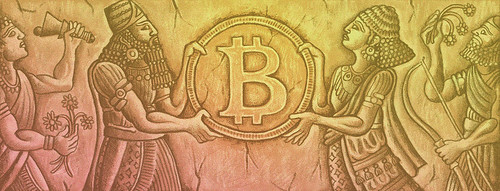
PREV ARTICLE
NEXT ARTICLE
FULL ISSUE
PREV FULL ISSUE
IS CRYPTOCURRENCY REALLY A NEW IDEA?Arthur Shippee forwarded this Yale Insights article on cryptocurrency. Thanks. here's an excerpt. -Editor

Imagine going on vacation if you had to barter along the way. Imagine taking a 401k distribution in barley. “Money is the most universal and most efficient system of mutual trust ever devised," writes historian Yuval Noah Harari. “Even people who do not believe in the same god or obey the same king are more than willing to use the same money." Yet, whether it's diamonds or gold, euros, yuan, or dollars, none have any inherent value; they can't be used as food or shelter. As Harari puts it, “Money isn't a material reality—it is a mental construct." Societies need to store and trade value. The units of exchange, institutional supports, and technologies involved have changed over time, but whether Sumerian silas of grain or the Bitcoins accepted in hipster coffee shops, currencies only exist if people believe they have value. Yale Insights talked with William N. Goetzmann, the Edwin J. Beinecke Professor of Finance and Management Studies and director of the International Center for Finance at the Yale School of Management, about how financial history informs our understanding of how cryptocurrencies are reimagining money. Q: There's a great deal of hype around cryptocurrencies. Do we know how much impact they will actually have? Cryptocurrency is a speculative instrument at present. The news that we hear is all about high prices being made or low prices being made, people becoming millionaires, and people losing their Bitcoin code. It's something that catches a lot of attention but is not fundamental to the economy. Q: What makes a currency successful? There are all sorts of theories, but we don't quite understand what makes a currency work and what makes it really liquid. You can create all sorts of currencies but getting people to spend them and to accept them almost requires a kind of magic. The United States makes dollar coins and two-dollar bills. Nobody spends them. Why not? There's really no good explanation. They just don't have liquidity. When the government thinks about revising the currency, they're cautious about disrupting people's reliance on doing things the way they've always done them. There are good reasons to consider getting rid of the penny but doing that would involve risk. When you're holding a physical penny, you trust that the dollar bill is worth 100 of them. Getting rid of the penny risks interrupting an institution that's worked really well, particularly for the United States. Q: Can financial history help inform our understanding of cryptocurrency? In ancient times, some of the money actually resembled today's cryptocurrency in the sense that it was all based on accounts, a ledger. There's no physical Bitcoin; you can buy, sell, and trade Bitcoin with other people, but it's really an accounting transaction more than anything else. Before coins were invented, value was transferred through a system of accounts. If you and I lived in the same city, you're a baker and I make pottery—a loaf of bread is one shekel of silver; a pot is three shekels—when we would trade with each other, we were not using actual pieces of silver. We were creating credits and debits in a ledger. That's kind of the way Bitcoin is working now; there's no physical transfer. The innovation in ancient times was the creation of metal coins that broke the reliance on an accounting system. Coins had no history. They were completely anonymous. Once I paid you, nobody knows what happened to that coin. You could use it for something completely different. Bitcoin today actually keeps a history in the blockchain, which is a distributed ledger that exists in no single place but is shared across a lot of participants. In a sense, we're going back to the time before we had anonymous money, transferrable by physical processes. That is exciting because each method of storing and transferring value solves different kinds of problems.
To read the complete article, see:
Wayne Homren, Editor The Numismatic Bibliomania Society is a non-profit organization promoting numismatic literature. See our web site at coinbooks.org. To submit items for publication in The E-Sylum, write to the Editor at this address: whomren@gmail.com To subscribe go to: https://my.binhost.com/lists/listinfo/esylum All Rights Reserved. NBS Home Page Contact the NBS webmaster 
|